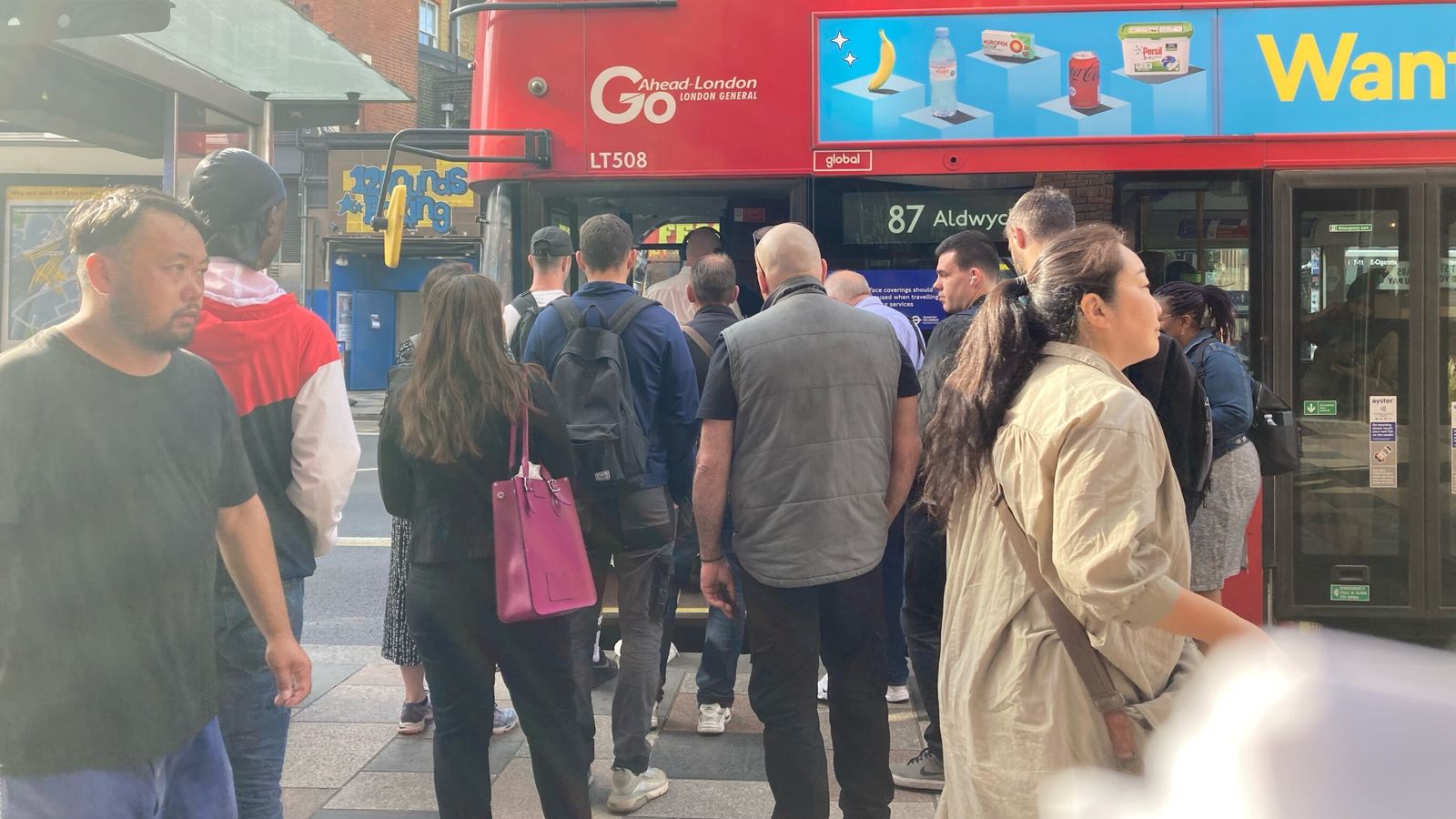Millions of people have been hit by major disruption today due to the largest strike by rail workers for a generation.
Just a fifth of trains are running and half of the lines are closed as around 40,000 members of the Rail, Maritime and Transport (RMT) union at Network Rail and 13 train operators have decided to walk out.
Services are generally restricted to main lines, but even those are only open between 7.30am and 6.30pm.
Anger as government ‘reveals redundancies date during late talks on dispute’ – rail strikes live
People are facing longer commutes, busier roads and some have been forced to spend more money in order to get to their destination.
In London, Rene Mance said the travel chaos had disrupted her journey to Glastonbury Festival where she was starting a new job.
“I can’t pretend it hasn’t been stressful. It has. I didn’t really sleep very well because I was worried about it,” the 47-year-old said, adding she had arrived two hours before her train was due to depart in fear of unforeseen complications.
Hundreds of websites knocked offline due to Cloudflare outage
Commuters must ‘stay the course’ in the face of ‘unnecessary aggravation’ of rail strikes, Boris Johnson warns
Train stations deserted as Britons hit by major travel disruption due to rail and Tube strikes
Due to travelling with heavy luggage, Ms Mance said she felt getting the bus would cause problems and was forced to pay almost £40 for a cab to the station.
She empathised with the strikers but questioned whether industrial action of this scale was the answer, especially given the difficulties faced by disabled people and those who cannot afford an expensive taxi.
As she waited for her train at Paddington Station, she said: “For many people, say a mother with kids or someone disabled, it’s absolute chaos. My situation whatever it is, I would have found a way, but you know, some people are not like me.
“They don’t have money to get in the cab, and it was a total luxury for me, but it worked.”
Please use Chrome browser for a more accessible video player
At Leyton Sixth Form, in east London, two students, Emmanuella Ameyaw and Harriet Owusu-Afriyie, spent more than an hour travelling to make it in time for their Religious Studies A-level exam.
They both live locally and normally travel by bus but Harriet said she had to get a taxi from halfway because the traffic was so bad.
“It’s really stressful because you want to be focusing on your revision instead of getting to school on time”, she said.
“I left the house an hour earlier than I would usually but I could definitely see the added stress”, Emmanuella added.
Both made it before the 9.15 start but their friend, who normally travels by train, rushed in 25 minutes late.
She’ll still be given the full three hours to sit the paper as she arrived within an hour of the start time, but Principal Gill Burbridge said it’s the last thing students need.
“It’s been a really problematic year for students for all sorts of reasons,” she said. “There’s been lots of anxiety and this is just another source of anxiety for them.”
At Clapham Junction, in the south-west of the capital, Jack Pook described the strikes as “very stressful” as he waited to board a train home after spending the night in hospital.
Originally from Winchester, the family support officer said he had travelled to London on Monday but collapsed while waiting for his train home that evening.
Standing on the platform in his hospital pyjamas, he said the experience has been “humiliating, stressful and caused worry” and he just wants to get back to his dog, Bardy, who had been left in day care.
At London Waterloo, a radiographer, who was trying to get to work, told Sky’s Kay Burley that it was going to cost her £80 to get a taxi.
She had been travelling for two hours by the time she got to the station but said she “kind of” understood why train workers are striking.
Please use Chrome browser for a more accessible video player
“We are in the same boat, we are potentially not getting a pay rise in the NHS but the people they need to hit they aren’t actually hitting,” she added.
“It is tough because everyone is struggling at the minute with costs, our costs are going up, national insurance has gone up, pension contributions have gone up so we are all struggling.”
In Glasgow, Scotland, Alice Aries, a freelance gardener, told Sky News that she hadn’t realised the strikes would affect her journey to Ayr and even bought a ticket.
The 30-year-old added that she is now looking at getting a bus to work, which could take 90 minutes.
“If I don’t get to work I won’t get paid so I’m not sure what’s going to happen. I understand the strike but it’s really inconvenient,” she said.
The rail and Tube strikes are also taking place on Thursday 23 and Saturday 25 June due to a dispute over pay and redundancies.
Unions have attempted to reach an agreement with the government but decided to push on with the industrial action after talks failed.






















